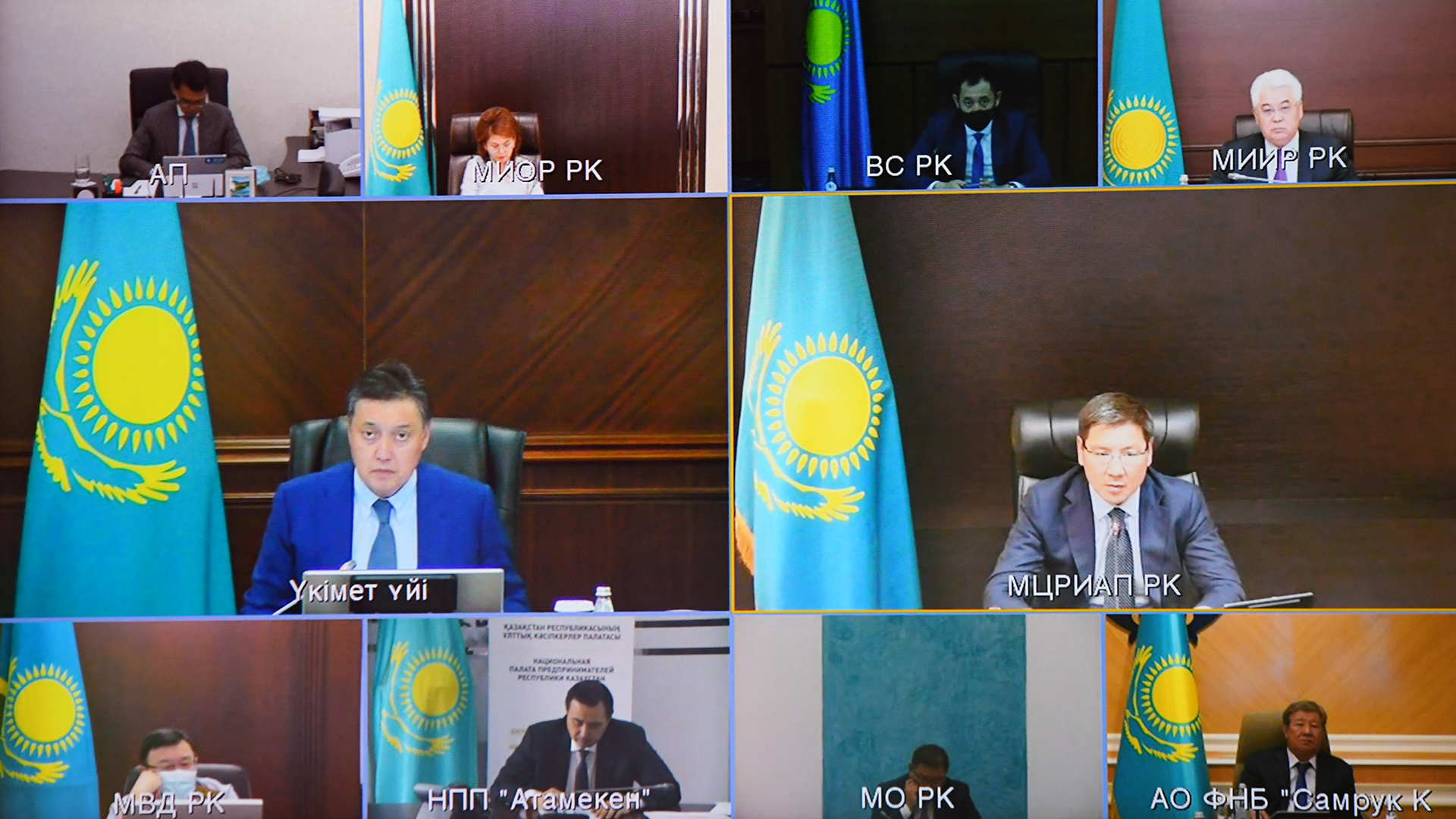NUR-SULTAN – Kazakhstan has a plan not to be left behind with global digitization efforts. Kazakh Prime Minister Askar Mamin chaired the meeting of the national commission on digitization on June 25 that explored the country’s digitization potential and reviewed its achievements.

Kazakh Prime Minister Askar Mamin chairs the meeting. Photo credit: primeminister.kz
The meeting was also attended by Kazakh Minister of Digital Development, Innovations, and Aerospace Industry Askar Zhumagaliyev, Kazakh Minister of Industry and Infrastructure Development Beibit Atamkulov, Kazakh Energy Minister Nurlan Nogaev and Kazakh Minister of Culture and Sports Aktoty Raimkulova.
The Digital Kazakhstan program launched in 2018 and generated a total economic effect of 802.5 billion tenge (US$1.97 billion) and created 120,000 jobs. As part of the program, amendments were made to 700 norms, 11 codes, and 58 laws.
In the latest United Nations E-Government Survey in 2018, which examined how digital technologies affect public services across its member states, Kazakhstan was placed in the 39th spot. Kazakhstan was, for the first time, ranked among the countries with the most developed e-governments, and listed among the top 10 countries in Asia.
The internet in Kazakhstan is among the most accessible in the world, as the cost per 1 gigabyte is $0.49, while coverage is at 84.2 percent. In comparison, in Ukraine, a gigabyte of data costs $0.51 and the coverage is 62.5 percent, in China it is $9.89 and the coverage is 61.2 percent, and in the United States, it is $12.37 and the coverage is 87.3 percent.
Nearly 84 percent of state services are provided online and the nation plans to bring the figure up to 90 percent in 2020. Kazakhstan’s electronic government website, currently the main channel for providing public services online, has 10.9 million users, and provides more than 800 services. The services are also available through a Telegram-bot, a mobile app, and the Government for Citizens state corporation. Altogether, these channels have provided 54 million services in 2019.
The ministries are also working to open digital factories at the enterprise level, which will help boost labor productivity by 25 percent, resource efficiency by 18 percent, equipment operational life by 5 percent, reduce operating costs by 20 percent, labor costs by 30 percent and energy costs by 35 percent. Such factories were opened at the Kentau transformer plant, the Eurasian Foods plant, the Almaty ventilator plant, the Khimfarm pharmaceutical factory, and the Karlskrona engineering plant.
As the program goes forward, the nation plans to introduce ten technological platforms. These include govtech, the smart city, the Industry 4.0 plan, agritech, blockchain, space-geotech, artificial intelligence (AI), e-industry, fintech, and greentech. These platforms will have a ready-to-go technical infrastructure, host large amounts of open data as well as development and analytical systems for local IT companies and startups.
The meeting also focused on the development of Industry 4.0, a term that is usually used interchangeably with the concept of the Fourth Industrial Revolution that will entail the mass digital transformation of production processes and industries as well as the incorporation of the latest smart technologies, including big data, the Internet of things, virtual and augmented reality, 3D printing, and quantum computing.
The platform will combine financial and information services, trading platforms and technology transfer systems, primarily for enterprises working in mining, metallurgy, energy and manufacturing.
During the meeting, Mamin instructed the Kazakh Ministry of Industry and Infrastructure Development chaired by Atamkulov to develop an action plan within a month that will include a set of regulatory and incentive measures to develop the new Industry 4.0 plan and expand the model digital factories project.
The same day, Kazakh President Kassym-Jomart Tokayev signed a law that introduces changes to the Kazakh legislative acts regulating digital technologies. The document is aimed at increasing the protection of personal data, creating a legal framework to introduce a single duty dispatch service at 112, and improve the quality of state and non-state services provided through the e-gov mobile app. It also envisions mechanisms for the safe operation of unmanned aerial vehicles, a plan to increase the number of robots in the country, and provides legal definitions for terms such as blockchain and AI.

